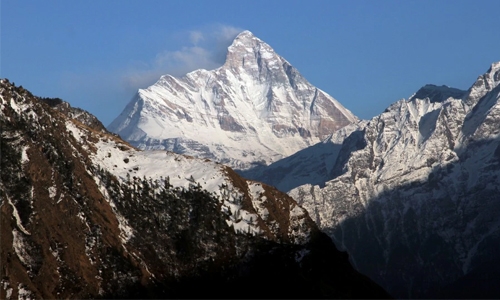Bodies spotted in search for missing climbers in India
A helicopter searching for eight climbers missing on India’s second-highest peak spotted five bodies yesterday, officials said. Nothing has been heard from the four Britons, two Americans, an Australian and an Indian on the 7,826-metre (25,643-foot) Nanda Devi in the Himalayas since May 26. But on Monday two Indian Air Force helicopters scoured the area for a third day and took aerial pictures. “During that search some photos were taken and in those photos four to five bodies can be seen. The resolution is quite bad that is why their faces or exact features are not clear,” said local official V.K. Jogdande.
“But what we can roughly say is that these are body parts of five persons which can be seen. We have ordered a technical evaluation... so that the bodies can be retrieved as quickly as possible,” he said. The search operation involving the helicopters and dozens of mountain rescuers has been hampered by poor weather and the remoteness of the area. Authorities were able to reduce the search area to roughly 50 square kilometres (20 square miles) on Monday following information from four British climbers rescued a day earlier from Nanda Devi base camp. They had been in contact with the larger group until May 26 when heavy snowfall and avalanches struck.
The missing climbers, led by Briton Martin Moran -- who has two previous successful ascents of the mountain -- had initially set out on May 13 for the eastern peak of Nanda Devi. But in a post on May 22 on the Facebook page of the mountaineering company he runs, Moran Mountain, said they were set to attempt “an unclimbed peak”. They were expected to report back to base camp on May 26 but a porter stationed there reported to authorities that the group remained missing on May 31, prompting the search operation.
No sign
A statement by the Moran family on Sunday had said they have been informed by the Indian Mountaineering Federation that the air search has “revealed the scale of the avalanche, but no sign of the climbers, their equipment nor their tents.” The Sydney Morning Herald named the Australian member as British-born Ruth McCance. It quoted her husband Trent Goldsack as saying that her last communication to him had been a text message around a week ago saying: “OK at base camp.”
Another of the British climbers was reported to be Richard Payne, a lecturer at the University of York. “We remain extreme - ly concerned for his safety and our thoughts are with his family, friends and colleagues at this difficult time,” a spokesman for the British university said. Hundreds of climbers from across the world visit India to scale mountains across the Himalayan chain, and the peaks of Nanda Devi are considered the toughest to scale. The first successful ascent of the Nanda Devi summit was in 1936.
Related Posts

